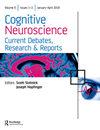功能主义者的合理标准;现象学视角下的稀缺标准。
IF 2.2
4区 医学
Q3 NEUROSCIENCES
Cognitive Neuroscience
Pub Date : 2021-01-01
Epub Date: 2020-12-06
DOI:10.1080/17588928.2020.1838473
引用次数: 2
摘要
在他们的文章中,Doerig等人提出了一套评估意识理论的标准。当然,他们的标准是建立在他们自己对意识科学的特殊观点上的,这一点我们在过去已经批评过了。他们的第一个标准可能是最有成效和争议最小的标准:如果该领域能够同意意识的范式案例家族,这将是该领域的一项重要努力。本文章由计算机程序翻译,如有差异,请以英文原文为准。
Reasonable criteria for functionalists; scarce criteria from phenomenological perspective.
In their article, Doerig et al suggest a set of criteria for evaluating theories of consciousness. Naturally, their criteria are situated in their own particular perspective on consciousness science, which we have critiqued in the past. Their first criterion is likely to be the one that is most productive and least contentious: if the field can agree to a family of paradigm cases for consciousness, this would be an important endeavor for the field.
求助全文
通过发布文献求助,成功后即可免费获取论文全文。
去求助
来源期刊

Cognitive Neuroscience
NEUROSCIENCES-
CiteScore
3.60
自引率
0.00%
发文量
27
审稿时长
>12 weeks
期刊介绍:
Cognitive Neuroscience publishes high quality discussion papers and empirical papers on any topic in the field of cognitive neuroscience including perception, attention, memory, language, action, social cognition, and executive function. The journal covers findings based on a variety of techniques such as fMRI, ERPs, MEG, TMS, and focal lesion studies. Contributions that employ or discuss multiple techniques to shed light on the spatial-temporal brain mechanisms underlying a cognitive process are encouraged.
 求助内容:
求助内容: 应助结果提醒方式:
应助结果提醒方式:


